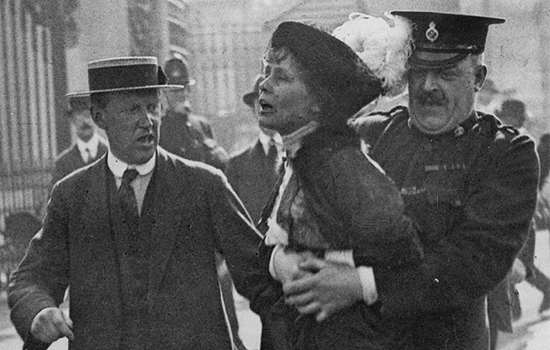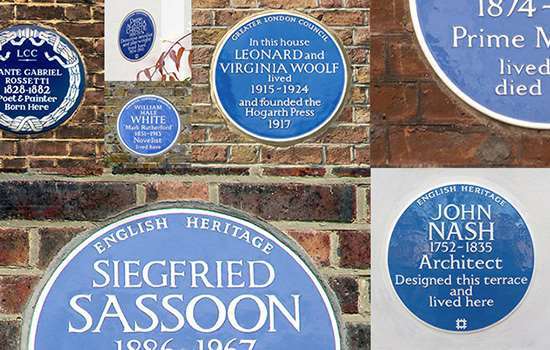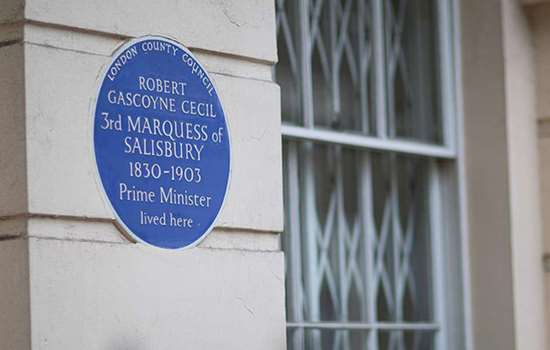RATTIGAN, Sir Terence (1911–1977)
Plaque erected in 2005 by English Heritage at 100 Cornwall Gardens, Kensington, London, SW7 4BQ, Royal Borough of Kensington and Chelsea
All images © English Heritage
Profession
Playwright
Category
Literature, Theatre and Film
Inscription
Sir TERENCE RATTIGAN 1911-1977 Playwright was born here
Material
Ceramic
British playwright, Sir Terence Rattigan was born on 9 June 1911 at 3 (now 100) Cornwall Gardens, South Kensington. Here he is commemorated with a blue plaque, his home throughout his formative years until the early 1920s.
Early Years
Terence Rattigan was the son of a diplomat, Frank Rattigan, and his wife, Vera Houston. His parents travelled extensively during Terence’s early years and he and his brother Brian were left in the care of their grandmother who lived at Cornwall Gardens – a four storey, brick building of a palatial scale, built in 1877–9.
Rattigan’s experiences in this severe, old-fashioned household inspired his literary work later in life, reflected in recurring themes such as his preoccupation with the lives of the middle classes, and the relationships between fathers and sons. South Kensington would also frequently serve as the backdrop for his stories.
It was while living at Cornwall Gardens that young Terence was taken to see his first play – a production of Cinderella – inspiring the seven-year-old’s passion for the theatre.
After education at Sandroyd School (1920–25) and Harrow (1925–30), Rattigan entered Oxford and became committed to the Oxford University Dramatic Society.
Theatre and Film
Having left Oxford without a degree in 1933, Rattigan’s first play, co-written with friend and collaborator Philip Heimann and fittingly named First Episode, was produced with mild success in 1934. The story was said to be partly based on his own unrequited passion for Heimann. Rattigan made his West End debut with French Without Tears in 1936. Despite some mixed reviews the play was a success and made Rattigan’s name.
For the next two decades Rattigan enjoyed uninterrupted success, producing classics such as Flare Path (1942) – which was based on his own experiences in the Royal Air Force, The Winslow Boy (1946), Playbill (1948), The Deep Blue Sea (1952) and Separate Tables (1954). At one point in the 1940s, Rattigan plays occupied three adjoining theatres on Shaftesbury Avenue for almost three years.
Rattigan also had a successful film career. He wrote screenplays for productions such as Brighton Rock (1947), The Browning Version (1951), Breaking the Sound Barrier (1952) – for which he was nominated for an Academy Award, The Prince and the Showgirl (1957) and Goodbye Mr Chips (1969).
Themes
Rattigan wrote with striking versatility covering romantic comedy, comedy of manners, farce, fantasy, history plays, courtroom drama and dramas about troubled middle-class characters. His stories were particularly centred on the emotional plights of his characters – unflinching portrayals of the folly, passion, and desperation of the human heart.
Much of his writings are said to address his own life experiences, including his feelings of being an outsider all his life – a feeling that was heightened by the need to keep his homosexuality hidden from the public (such relationships between men were illegal in Britain until 1967). Any references to this side of his life were only ever hinted at in his writings.
It is believed that Rattigan first conceived The Deep Blue Sea as a play that focussed on male homosexual relationships. After the end of theatrical censorship in 1968, Rattigan wrote:
…at last I can write about my particular sins without Lord Chamberlain-induced sex-change dishonesty … Perhaps I should re-write Deep Blue Sea as it really was meant to be, but after 20 years I just can’t remember why I made all that fuss.
Later Years
With the advent of so-called ‘Kitchen Sink’ drama in the mid-1950s, Rattigan’s work became unpopular and was dismissed as out-dated and irrelevant. A difficult period for Rattigan, he was also diagnosed with leukaemia in 1962. A few years later Rattigan left England permanently, and went to live in Bermuda.
However, this was not the end of his career and Rattigan’s work would see a renaissance in his later years. He was knighted in 1971, continued to write screenplays and television scripts, and lived to see several revivals of his plays. His last work, Cause Célèbre (1977) was a success. On his death in 1977, Rattigan was described as an ‘enduring influence in the English theatre’, who had ‘the greatest natural talent for the stage of any man in this century’.


